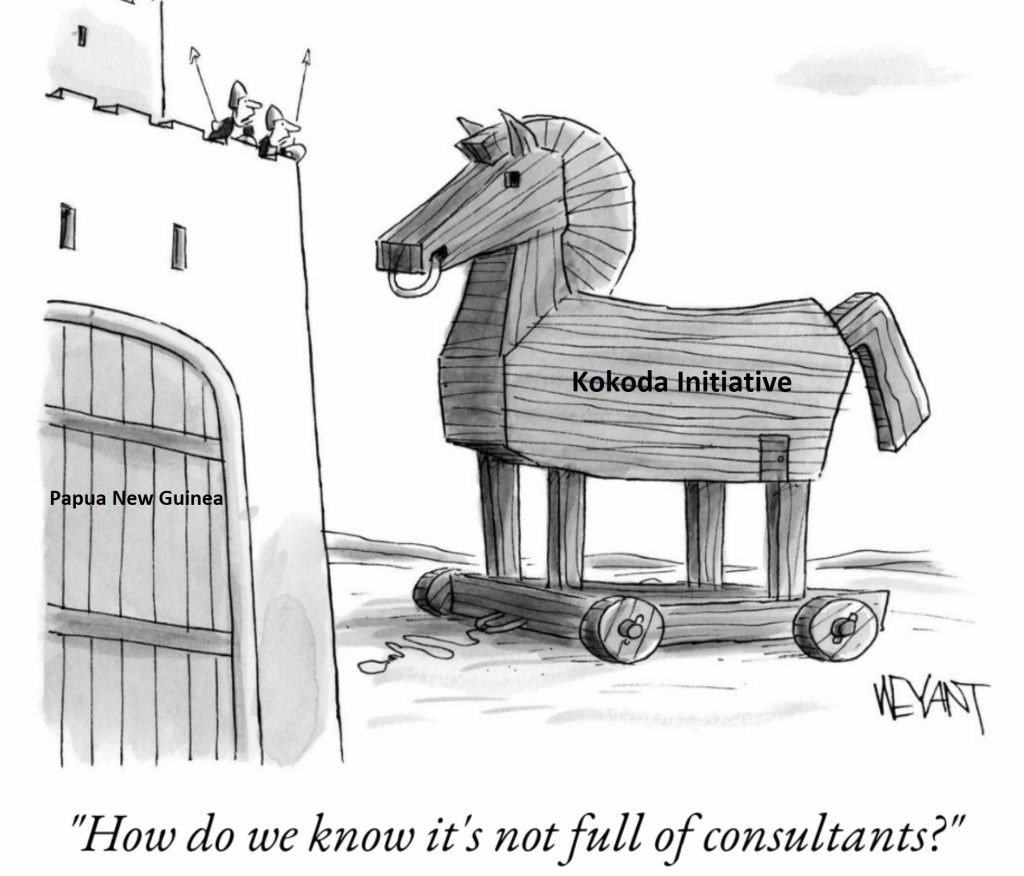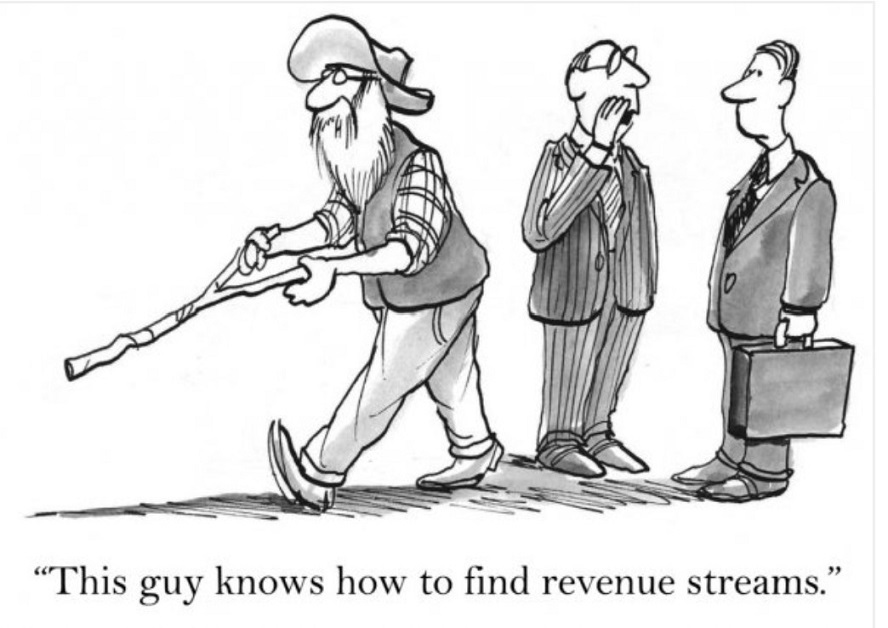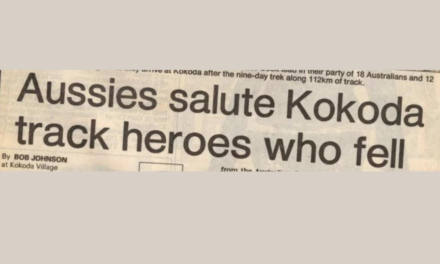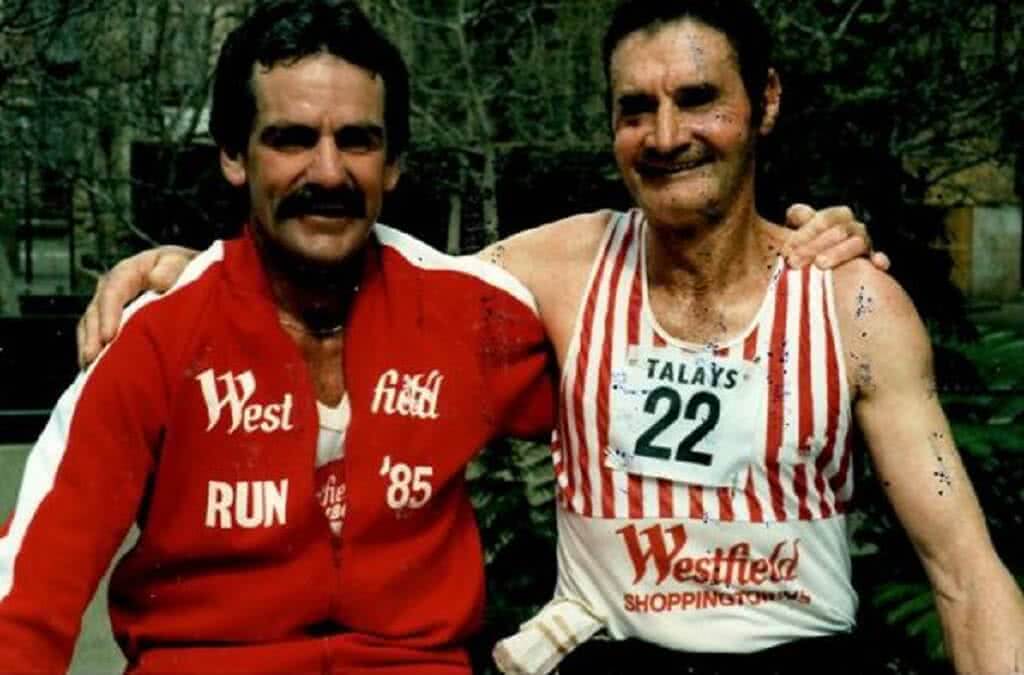‘I’ve been trekking the Kokoda Trail for the past 25 years and have just completed my 80th pilgrimage.
‘I can report that the standard of facilities for trekkers along the trail continues to decline and are now in their worst condition ever. Some toilets are so putrid that female trekkers prefer to ‘go bush’ rather than use them. There is not a single campsite that meets the needs of a professional trekking industry. The military heritage of the trail continues to be degraded. The environmental erosion along sections of the trail is appalling. There is no structured engagement with local communities along the trail and they are missing out on the opportunity to earn up to one million kina each year in additional earnings. PNG guides and carriers continue to be exploited by being overloaded and poorly equipped.’
Charlie Lynn, August 2015
It was no surprise that their report fails to address the reality of the Kokoda trekking industry.
This preliminary review of the Trip Consultants Master Plan (see Appendix 1) is based on the views of professional Kokoda trek leaders with a combined total of 130 years professional military service and 55 years’ experience in PNG. They have led more than 600 expeditions across the trail over the past 25 years.
The two most important stakeholders in Kokoda tourism were ignored in the development of the Master Plan by Trip Consultants. There is no evidence that any of the consultants involved in the development of the plan actually trekked across the Kokoda Trail and engaged with local landowners and village communities to assess their needs. Nor is there any evidence of them conducting a review of the most important stakeholder i.e. paying customers, to assess their needs.
Appendix C of the Master Plan lists the names of 56 stakeholders interviewed as part of the desktop review. Of these only six are licensed Kokoda tour operators. The review does not include any of the concerns raised in my extensive interview with a number of people engaged by Trip Consultants nor does it reflect any aspects of the report I submitted to them.
By its own admission the Master Plan ‘identifies medium and long-term development priorities which support the identified KI Vision and Goals and highlights key roles and institutional requirements for support implementation’.
The report fails to address the urgent and immediate short-term needs of the Kokoda trekking industry!
It makes no reference to the fact that during the time the Australian Government assumed responsibility for the management of the Kokoda Trail (2009-2012) trekker numbers declined by 44 per cent from 5,621 to 3,156 despite the injection of more than $40 million in aid funding!
The report fails to mention that not a single one of the 5 strategies or 33 key performance objectives contained in the Kokoda Track Authority Strategic Plan 2012-2015 by the Australian Department of Environment has been achieved.
The report also fails to make reference to the potential for significant philanthropic development throughout PNG as a result of the experience of wealthy and influential people amongst the 40,000 Australians who have trekked Kokoda over the past decade. The failure of the Australian Government to develop a database for the management authority since assuming control of the Kokoda trekking industry in 2009 has resulted in 40,000 lost opportunities for ongoing philanthropic support.
The report advises that ‘Priorities are broadly identified through the Plan, which would provide the basis for implementation, as well as (in some instances) further analysis and evaluation, as well as further dialogue between key partners, including the Governments of PNG and Australia.’
This statement has more to do with securing ongoing consultancy work than with meeting the needs of the Kokoda trekking industry.
A more detailed analysis of the Master Plan is in progress and will be submitted as soon as it is complete.
Options for the Kokoda Trekking Industry
There are two options available for the future direction of the Kokoda trekking industry:
- To operate as a subsistence industry reliant on Government aid-funding; or
- To operate as a self-sufficient, sustainable and profitable government enterprise.
The Master Plan developed by Trip Consultants is based on Option 1.
This review is based on Option 2.
Four Pillars Essential for a Successful Kokoda Trekking Industry
The four pillars essential to a self-sufficient, sustainable and profitable government enterprise are:
- The Kokoda Trail (Page 2);
- The People (Page 3);
- The Kokoda Campaign (Page 5); and
- The Environment
Pillar1: The Kokoda Trail
The Kokoda Trail comprises a series of wartime tracks between Owers Corner in Central Province and Kokoda in Oro Province. The battle honour ‘Kokoda Trail’ was awarded to the Papuan Infantry Battalion and the 10 Australian battalions who fought in the Kokoda campaign by the Battles Nomenclature Committee as the official British Commonwealth battle honour in October 1957.
According to Michael Pender of HPA Projects Australia[3] (designer of commemorative wartime heritage sites at Isurava; Hell Fire Pass – Thailand – Sandakan, Borneo; Villers-Bretonneux – France):
‘The Kokoda Trail is a world class heritage site. It is currently Papua New Guinea’s top tourist attraction and; it is a place of significance for Australians due to the military actions of 1942.
‘The heritage significance is derived from its cultural diversity, its natural biodiversity and untouched beauty and the Military heritage of WW2.
‘In October 2007 the Australian Government approved $15.8 million dollars in funding to assist Papua New Guinea “to protect the Kokoda Trail”. The Joint Understanding Kokoda Initiative (2008) has focused on health, safety and education on the trail itself – arguably with limited success.
‘In 2010 the Independent ‘Howes Review of aid funding’ recommended that “future funding build on demonstrable success”; Kokoda is one of those success’s, with a fledgling trekking industry that sustainably supports remote village communities. The growth of this trekking ‘industry’ is largely derived from the significance of Heritage that is Kokoda, to Australians.
‘Whilst the broad elements of a development strategy appear an inclusive part of the Kokoda Initiative, a documented and endorsed Heritage Plan would appear notably absent; notable as the trails sustainability and its fledgling trekking industry are directly related to the Heritage. How this heritage is communicated and how it enhances the ‘significance of place’, whilst enshrining and protecting the core values inherent in the environment are key questions that are considered in this report.
The condition of the trail has deteriorated significantly since the Australian Department of Environment assumed control in 2009. The environmental degradation of sections of the trail in the Mt Bellamy – Templeton’s Crossing – Eora Creek area is disgraceful.
Responsibility for the condition of the trail should therefore be returned to local landowners who should be remunerated for maintaining all sections of the trail.
The introduction of a K100 ‘Trail Maintenance Levy’ per trekker would achieve this.
Licensed trek operators could be engaged to provide ongoing feedback to the management authority rather than relying on the expense of engaging consultants to conduct desktop reviews.
Pillar 2: The People
- Paying Clients
Paying clients i.e. customers, are those who pay a substantial amount of money to trek across the Kokoda Trail. It is therefore imperative for any plan associated with the future development of the Kokoda trekking industry to address their needs. Unfortunately paying clients have been ignored by Australian Department of Environment officials, management staff and consultants since they assumed control of the Kokoda trekking industry in 2009.
The needs of paying clients are relatively simple. They require:
- An assurance they will be safe in PNG in general and along the Kokoda Trail in particular;
- Knowledgeable presentations on the history of the Kokoda campaign;
- Group campsites with facilities for the erection of tents, food preparation, dining and clothes drying (as well as sheltered huts and cooking facilities for their guides and carriers); and
- Clean toilets and ablution facilities for men and women.
2. Trek Operators
Trek operators are the backbone of the trekking industry as they invest time, money and considerable resources in marketing, sales, logistics and trek operations. They carry all of the risk associated with operating a trekking business in a remote area of PNG.
The primary role of a management authority for the Kokoda trekking industry is to ensure that the same rules and regulations apply to all trek operators i.e. develop regulations that provide for a level playing field in regard to the required duty of care for the welfare of their clients, the PNG guides and carriers they engage and the local campsite owners.
3. Campsite Owners
Separate campsites should be developed to cater for the needs of various size groups. Campsite owners should be provided with a standard layout plan for each site. Government should be prepared to assist local campsite owners in siting, planning, designing and developing each site.
Trek operators should be able to book sites online. This would allow the management authority to manage trek itineraries and to collect campsite fees for trekkers and guides/carriers in advance. They could then make direct deposits into the bank account of the respective campsite owner. Monies could be withheld if trek operators/rangers report that facilities are not adequate or clean.
4. Villagers
Villagers who live along the Kokoda Trail are the custodians of land that is sacred to our shared wartime heritage. Unfortunately they have become the ‘forgotten people’ since the Australian Department of Environment became involved in the management of the Kokoda trekking industry in 2009. Since then not a single village workshop has been conducted in either the Koiari or Orokaiva areas of the trail. As a result local leaders have been effectively snubbed and disenfranchised from the planning and community development process.
It is imperative that local villages receive shared community benefits from the Kokoda trekking industry. This includes the engagement of local guides and carriers and their welfare; the development of economic opportunities; income from campsites and significant wartime historical sites; together with support in the areas of health and education.
The most effective way to meet the needs of local communities is to engage with them in their respective wan-tok areas via the conduct of annual workshops.
The implementation of a K100 ‘Community Development Levy’ per trekker would provide sufficient funding for significant local projects to meet the needs of each village along the trail each year.
5. Kokoda Trail Rangers
The current KTA ranger system is dysfunctional because those selected for the positions have never been properly trained.
Australian Army Captain, Reg Yates, who has been trekking Kokoda for almost 30 years and who is fluent in Tok Pisin, applied for the position of Chief Ranger but was not selected because of the Department of Environment’s politically correct insistence that the position be awarded to a PNG local – even if that person was unqualified and inexperienced!
Captain Yates, an expert of the Pacific War in PNG, is also a qualified ambulance officer and paramedic. If a person with his trekking experience, historical knowledge, respectful relationships with villagers along the trail and his medical qualifications had been engaged to select, train and monitor rangers along the trail for a period of two years we would now have a world-class system of on-trail management.
Training rangers to the standard of para-medic, which Captain Yates is qualified to do, would also provide an emergency medical service for local villagers in need of emergency assistance and would enhance the capacity of local health centres.
6. PNG Service Providers
In the early stages of the Kokoda trekking industry most of the administration and logistics for trek operations had to be organised from Australia. This is no longer necessary as all of the requirements can now be sourced from Port Moresby.
There is now scope for the establishment of local PNG service provider companies to support Australian based trek operators. Personnel and logistic support for trek operations includes the engagement of guides and carriers; the purchase of groceries; local transport and accommodation; storage of camping equipment; provision of communications equipment; booking of charter aircraft; confirmation of campsite bookings, etc.
Pillar 3: The Kokoda Campaign
Australians are motivated to trek across the Kokoda Trail because of the historical significance of the Kokoda campaign in 1942. This is the major point of difference between the Kokoda Trail and other tracks across the Owen Stanley Ranges such as the Kapa Kapa Track to the east of the trail (an ideal alternative for those who are not as interested in wartime history).
The Kokoda Trail has no equal as a wartime historical pilgrimage anywhere in the world.
Unfortunately this fact has been ignored by the Australian Government which has failed to develop a master wartime heritage interpretation plan to honour each significant battlesite across the trail.
There is certainly no need for yet another consultant to be engaged to do this as inferred by Trip Consultants as these sites are already known to those who have studied the Kokoda campaign, They include:
- Owers Corner
- Imita Ridge
- Ioribaiwa Ridge
- Wartime Nauro
- Menari
- Brigade Hill
- Mission Ridge
- Lake Myola
- Templeton’s Crossing
- Eora Creek
- Abuari
- Isurava
- Deniki
- Kokoda
Network Kokoda engaged Michael Pender of HPA Projects Australia (heritage architects who understand the principles of commemoration) to prepare a Funding Proposal Report for a Heritage Interpretations Plan and Implementation Strategy for the Kokoda Trail in the lead-up to the 70th anniversary of the Kokoda campaign.
Following is an extract from the Executive Summary of the Funding Proposal relating to the military heritage of the Kokoda Trail:
‘The Kokoda Trails’ military heritage has an important place in Australia’s history that has attracted significant interest over the past 10 years evidenced primarily in trekker numbers on the Trail itself and significant literature sales. However, in stark contrast the Papua New Guinea contribution to the Kokoda battles, affectionately remembered in Australia, as the ‘Fuzzy Wuzzy Angels’ is largely absent from literature, and is slowly being consigned to memory alone.
‘Unfortunately for PNG the heritage inherent in Kokoda has become a ‘local commercial benefit’ through trekking, rather than a shared national cultural heritage experience. ‘International examples show that Heritage and protection of heritage is generally underpinned by a formulated site specific Heritage Plan.
‘Typically these documents constitute a foundation from which sustainable practices of development and tourism are derived.
‘A Heritage Interpretation Plan is considered the key mechanism for delivering Cultural and Natural Heritage for the sustainable benefit of the indigenous population, the environment and the visitor.
‘Currently, the Kokoda Trail has no Heritage Interpretation Plan, there is no Natural Heritage interpretation on the Trail; there is no Cultural Heritage interpretation on the Trail, generally military heritage interpretation has been installed by private ‘donors’, is poorly built, and in many cases shows significant factual inaccuracy. In effect, a deleterious environmental effect is in evidence.
‘If funded the program of work can regard its primary objective as enshrining the sites Cultural, Natural and Military Heritage for the long-term sustainable benefit of the local people, and the nations of Australia and Papua New Guinea.’
A copy of the full report by HPA Projects is attached as Appendix 2.
It is clear from this report that Michael Pender is a professional in the interpretation of our wartime heritage in accordance with the principles of commemoration. Trip Consultants are not.
Pillar 3: The Environment
The pristine jungle environment across the Kokoda Trail has been badly affected since the Australian Department of Environment assumed control of the Kokoda trekking industry in 2009.
Some action was taken in the early stages of Australia’s management of the trail. This involved some ‘trail specialists’ and a team of Australian volunteers. They did some good work in the Nauro swamp and Mt Bellamy areas. Unfortunately they never returned and they obviously failed to pass on their knowledge to local villagers. In the absence of a trail maintenance plan the environmental erosion along sections of the trail in the Nauro swamp – Mt Bellamy – Templeton’s Crossing – Eora Creek areas has been appalling.
Over the past two years KTA rangers have made a significant contribution to the safety and environment of the trail through the building of bridges from local material. The construction of these bridges will become a feature of the trek experience due to their unique design. The rangers have also improved some sections of the trail in the Templeton’s Crossing area.
The solution to protecting the environment is simple. Develop trail maintenance partnerships with local landowners and pay them a fee from a K100 ‘Trail Maintenance Levy’ per trekker. This would have the added benefit of providing meaningful work for local landowners all-year round.
Wrap-Up
The major beneficiaries of the Kokoda trekking industry since 2009 are Australian environment officials and consultants.
The potential of the Kokoda Trail as a world-class pilgrimage has been impeded by Australian government officials and consultants who have no understanding of the realities of the Kokoda trekking industry or the commercial complexities of operating a trekking company in PNG. This is supported by the fact that after 8 years in-situ and more than $40 million of aid funding there is not a single management protocol in place. For example:
- The website for the Kokoda Track Authority is obsolete and largely irrelevant to their primary role of managing the Kokoda trekking industry;
- there is no online booking system;
- there is no campsite booking system;
- there is no campsite developments system to meet the needs of the paying customer;
- there is no trek itinerary management system;
- there is no protection for the welfare of PNG guides and carriers;
- there is no campsite audit system to ensure landowners are paid the correct amount owing;
- there is no military heritage master plan;
- there is no trail maintenance plan;
- there is no village community development plan; and
- there is no plan to assist villager to earn additional income from trekkers – for example it is not possible to but a cup of brewed coffee along the entire Kokoda Trail – and PNG is the coffee capital of the Pacific!
The two most important stakeholders in the Kokoda trekking industry i.e. the clients who pay to trek and the traditional owners of the land they trek across, have been continually ignored since the Australian government assumed control in 2009.

Recommendation
That the Master Plan developed by Trip Consultants in August 2015 be disregarded and that the attached paper ‘Kokoda: The Way Ahead’ (produced at no cost to the Australian taxpayer) be used as the basis of a model for the management of the Kokoda trekking industry and for the development of a wartime tourism industry in PNG.
Attachments:
- Appendix 1: Kokoda Initiative Master Plan Final Report by Trip Consultants – August 2015
- Appendix 2: Funding Proposal Report for a Heritage Interpretations Plan and Implementation Strategy for the Kokoda Trail
- Appendix 3: Kokoda: The Way Ahead by Charlie Lynn OL
[1] Charlie Lynn is a former army major who has led 80
treks across the Kokoda Trail over the past 25 years. He is a former
Parliamentary Secretary for Veterans Affairs in the NSW Government where he
served as a Member of the Legislative Council for 20 years. He was instrumental
in establishing the PNG Kokoda Track Authority in 2003 to ensure villagers
along the trail received shared benefits from the emerging trekking industry
and to establish a model for wartime tourism in PNG. In 2015 Charlie was
inducted as an Officer of the Logohu by the PNG Government in their New Years’
Honours list ‘for service to the bilateral relations between Papua New Guinea and
Australia and especially in the development of the Kokoda Trail and its
honoured place in the history of both nations’ over the past 25 years.
[2] The origin of the official name, ‘Kokoda Trail’, dates back to 1947 when an Australian Battles Nomenclature Committee was established to define the battles in the Pacific. Their final report in 1958 adopted ‘Kokoda Trail’ as the official Commonwealth battle honour which was awarded to 10 infantry battalions and the Papuan Infantry Regiment. During the establishment of self-government in PNG in 1972, Australian administrators established a ‘Place Names Committee’ to examine the issue and recommended the official name be proclaimed ‘Kokoda Trail’. One can assume they would have been influenced by the decision to award the official battle honour ‘Kokoda Trail’ to the battalions who fought in the Kokoda campaign 14 years earlier. The PNG Chief Minister assumed office on 23 June 1972 when the nation achieved self-government as part of the process to independence in 1975. Somare accepted the recommendation of the Place Names Committee and the name ‘Kokoda Trail’ was gazetted four months later on 12 October 1972 (PNG Government Gazette No. 88 of 12 October 1972, page 1362, column 2. Notice 1972/28 of the PNG Place Names Committee refers).‘Kokoda Track’ has emerged as the politically correct term in Australia because of an anti-American bias amongst the commentariat and a profound ignorance of the American commitment to victory in the Pacific from 1942-45.
[3] Michael Pender was commissioned and funded by Network Kokoda (www.networkkokoda.org) to prepare a Funding Proposal for a Heritage Interpretation Plan and Implementation Strategy for the Kokoda Trail for the 70th anniversary of the Kokoda campaign.





